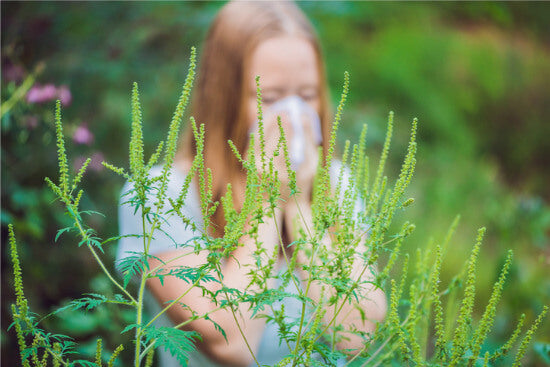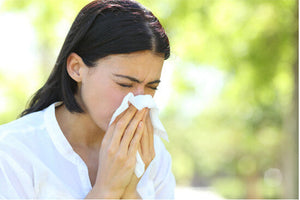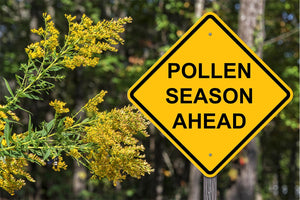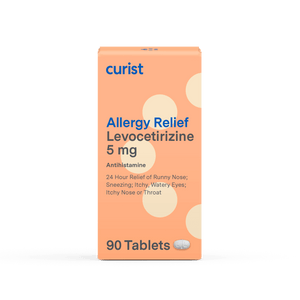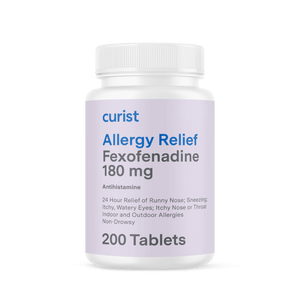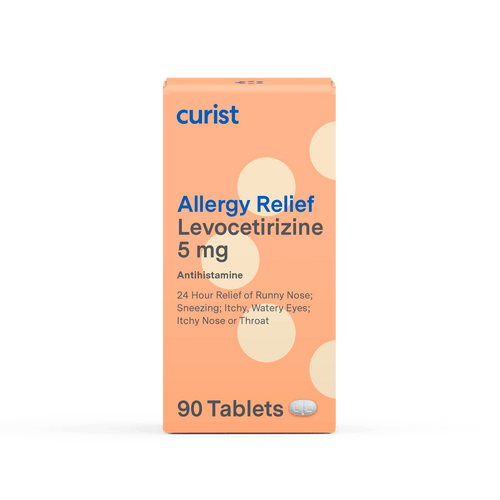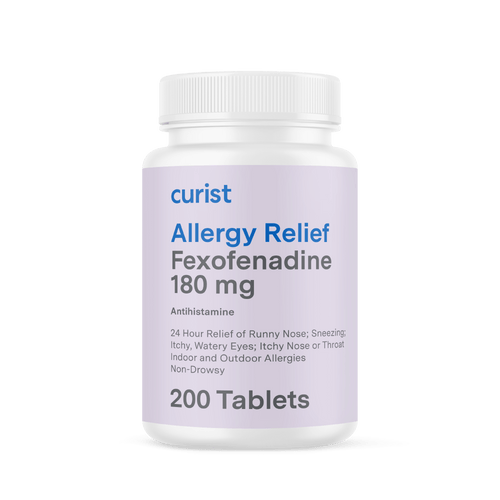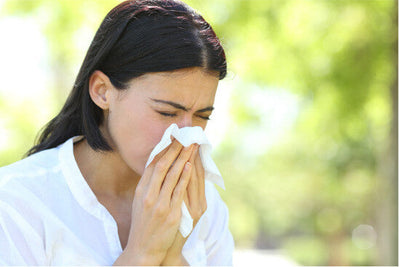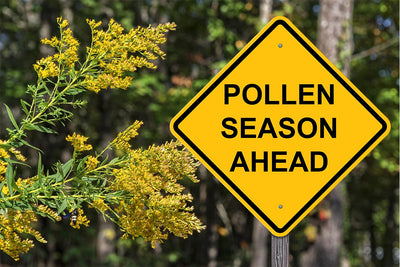By Abhignya Mallepalli, Columbia University Mailman School of Public Health, and Dr. Marc Goldstein, MD, Curist Medical Advisor
Curist delivers over-the-counter medicines to your door at a fraction of the price of traditional brands. We hope everyone stays safe and healthy during this time.
What is Ragweed Pollen?
Ragweed is a common daisy-like weed in the United States that typically begins to release pollen in the late summer. More than 17 species of ragweed grow in the United States and cause allergies in over 23 million people every year. While ragweed plants only last for one season, each plant is capable of releasing up to a billion pollen grains each year.
Season & Symptoms: What is Ragweed Allergy?
A ragweed allergy, like other seasonal allergies, is an immune response to the pollen released by ragweed. Ragweed allergies tend to peak in the fall, and ragweed is the biggest allergy trigger for that season. Ragweed allergies are also closely linked to spring pollen allergies; in fact, 75 percent of people who experience spring allergies are also allergic to ragweed.
Typical symptoms of ragweed allergies are:
- Sneezing
- Itchy and/or watery eyes,
- Runny and/or congested nose
- Sinus pressure and possible postnasal drip
Is Ragweed Allergy Related to Food Allergies?
People with ragweed allergies may also find that certain foods can also trigger allergy symptoms. This phenomena is known as oral allergy syndrome, which is characterized by mouth and throat itchiness when eating certain raw fruits or vegetables. Foods that are related to ragweed allergies include:
- Bananas
- Cucumbers
- Melons (cantaloupes, honey dew, watermelon)
- White potato
- Zucchini
These oral symptoms are a mild food allergy caused by cross-reactive proteins present in these foods that is similar to the proteins found in ragweed. Usually, the tingling and burning eventually subside after contact with the food ends. People can avoid oral allergy symptoms by peeling, cooking, or baking the offending foods to destroy the proteins responsible for the reaction.
What is Ragweed Rash and How Do I Treat It?
Ragweed rash, or ragweed atopic dermatitis, is an itchy rash that usually occurs on eyelids, the sides of the neck, and forearm creases in reaction to airborne ragweed pollen. Farmers, gardeners, and other people who spend a lot of time outdoors are prone to developing this rash. People who tested negative for a ragweed allergy through a skin prick test may still experience ragweed rashes.
A few steps can help reduce your exposure to ragweed and treat ragweed rash if it occurs:
- Limit the amount of exposed skin when outdoors.
- Wash all clothing to avoid spreading pollen throughout your home.
- Treat itchy rashes with over-the-counter hydrocortisone creams and antihistamines, like those available from Curist.
Can Ragweed Allergy Cause Itchy Skin or Hives?
Unfortunately yes. Along with other allergy symptoms, like sneezing, itchy eyes, and watery eyes, ragweed can cause itchy skin and hives. Ragweed-related itchiness may also be accompanied by rashes. In addition to reducing your exposure to ragweed by limiting time outdoors, antihistamines can help reduce your ragweed related allergy symptoms. To learn more about itchy skin and hives, read Curist team member Waverly’s story about her experiences diagnosing and treating itchy skin.
Do I Live in a Ragweed Season Hot Zone?
Ragweeds grow in all of the United States, except for Alaska, but they tend to proliferate the most in the East and Midwest. The severity of ragweed allergy season depends on a combination of weather conditions and specific geographic pollen levels. In windier and warmer areas, like Wisconsin or Kansas, ragweed pollen carries more easily and causes widespread symptoms. As with other allergens, rain and lower temperatures slow down the spread of pollen through the air. Check pollen levels in your area through weather reports or sign up for email alerts through the National Allergy Bureau.
When Does Ragweed Season Officially Begin?
Ragweed season begins as summer nights become cooler and longer. This typically occurs in mid-August, but climate change is causing allergy season to begin sooner and last longer. Some cities are bracing themselves for a ragweed season beginning in early August, meaning people with allergies should begin preparing for ragweed season in July! Some allergy treatments, like Curist Allergy Nasal Spray, take up to two weeks to fully build a defense against allergens, so Curist Medical Advisor Dr. Marc Goldstein recommends starting a few weeks prior to the start of the ragweed season for maximum benefit.
How Long Does Ragweed Pollen Season Last?
Ragweed season peaks in mid-September and ends at the first frost. Rising temperatures mean the first frost occurs later and later each year, resulting in a longer lasting allergy season. Since ragweed season lasts anywhere from six to 10 weeks, Curist recommends stocking up on three months’ worth of allergy treatment in advance of the season.
How Do I Treat Ragweed Allergies and Rash? What Is The Best Antihistamine for Ragweed Allergies?
Ragweed allergies are treated similarly to other environmental allergies. Antihistamines and nasal sprays that target histamines and other inflammatory substances protect your body from reacting to allergens, and are some of the most common medicines to treat ragweed allergy symptoms.
- Antihistamines work very quickly (typically within 24 hours) and are best used daily to maintain symptom relief throughout the allergy season. Curist Allergy Relief is a third-generation antihistamine that provides 24-hour and is not-drowsy in most people.
- Nasal Steroid Sprays treat many of the same symptoms as antihistamines, but can provide additional targeted nasal relief including clearing nasal congestion. These sprays may take up to 2 weeks until they provide maximum protection, so its recommended to start taking ahead of the start of the ragweed season. Curist Allergy Nasal Spray is a prescription-strength allergy nasal spray that provides 24-hour, non-drowsy to ragweed allergy symptoms.
- Decongestants and Expectorants can treat secondary allergy symptoms, like congestion and mucus. Though antihistamines are powerful, they cannot treat congestion or reduce mucus that’s often associated with ragweed allergies (these are things like postnasal drip, or sinus congestion). Curist Mucus Relief is one such medicine that can help clear mucus from your system.
Can I Treat Ragweed Allergy Without Medicine or Antihistamines?
Several handy tips can help you reduce your exposure to ragweed and therefore improve your symptoms. Though these tips may not provide complete allergy relief, they can help reduce your symptoms significantly. Here are our top tips:
- Change your clothes and remove your shoes when coming inside your home to avoid bringing ragweed indoors. Since ragweed pollen’s weight is very light, it easily attaches to clothing and can both continue to trigger your symptoms in addition to spreading throughout your home.
- Wash your fash and hair, including eyebrows and facial hair, because ragweed likes to live there!
- Keep your windows closed in your home and car to reduce additional explore.
For more drug-free tips to treating allergies, including ragweed, check our articles Tips to Treat Allergies Without Medicine and Outdoor Allergy Tips: Enjoy Your Picnic Allergy Free
Can Ragweed Pollen Trigger Other Conditions Besides Allergies?
For most people, ragweed allergies can be managed with a simple but strict regime of antihistamines, nasal sprays, and decongestants. For some people with more severe allergies, ragweed can trigger symptoms like asthma, chronic sinusitis, and headaches. Consult with a doctor to discuss additional interventions to address more severe symptoms related to your allergies.
